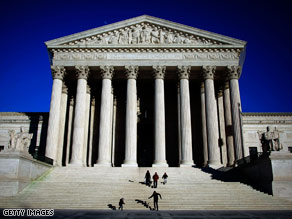Court blocks release of sex offenders due out of jail
- Story Highlights
- As many as 77 North Carolina inmates are scheduled to be released
- Obama administration claims many of them remain "sexually dangerous"
- The men must remain in jail for now
- Next Article in Crime »
CNN Supreme Court Producer
WASHINGTON (CNN) -- The Supreme Court has blocked the imminent release of dozens of sex offenders who have served their federal sentences after the Obama administration claimed many of them remain "sexually dangerous."

The Supreme Court has blocked the release of sex offenders after claims they remain dangerous.
Chief Justice John Roberts on Friday ordered that the men be kept in custody while the case works its way through a federal appeals court, which had ruled as many as 77 North Carolina inmates should be released, some as early as next week.
At issue is whether the government has the power to indefinitely detain prisoners who have served their sentences but could pose a public threat upon release. Such laws are known as "civil commitments."
The Justice Department filed papers with the high court Friday, asking that any release be put on hold until the justices have more time to consider the larger legal issues raised in their appeal.
Such an early release "would pose a significant risk to the public and constitute a significant harm to the interest of the United States," wrote Solicitor General Elena Kagan, who took office this month.
Don't Miss
The Adam Walsh Child Protection and Safety Act passed by Congress in 2006 included a provision allowing indefinite confinement of sex offenders. A federal appeals court in Richmond, Virginia, ruled lawmakers had overstepped their authority, prompting the emergency appeal to the Supreme Court.
The law was named after the son of "America's Most Wanted" host John Walsh. The boy was kidnapped and murdered by a suspected child molester in 1981.
Four inmates brought suit against the law. They were serving sentences of up to eight years for sexual abuse of a minor or possessing child pornography. Their detention was to have ended two years ago, but corrections officials and prosecutors determined they remained a risk for further sexually deviant behavior if freed. The inmates argued such continued imprisonment violates their constitutional right of due process.
The justices' actions means the men remain behind bars for now.
The case is U.S. v. Comstock (08A863).
All About U.S. Supreme Court

 Sit tight, we're getting to the good stuff
Sit tight, we're getting to the good stuff
